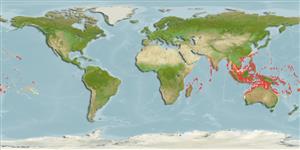Common names from other countries
>
Eupercaria/misc (Various families in series Eupercaria) >
Caesionidae (Fusiliers) > Caesioninae
Etymology: Pterocaesio: Greek, pteron = wing, fin + Latin, caesius = blue grey (Ref. 45335).
More on author: Cuvier.
Environment: milieu / climate zone / depth range / distribution range
Οικολογία
Θαλασσινό(ά) Υφαλόφιλο(α); μη μεταναστευτικό(ά); εύρος βάθους 0 - 60 m (Ref. 37816). Tropical; 29°N - 33°S, 39°E - 131°W (Ref. 402)
Indo-Pacific: East Africa, not including the Red Sea or the Arabian (Persian) Gulf, to the Tuamoto Archipelago, as far north as southern Japan and south to Mauritius and the Austral Islands.
Μέγεθος / Βάρος / Age
Maturity: Lm ? range ? - ? cm
Max length : 30.0 cm TL αρσενικό/απροσδιόριστο; (Ref. 402); common length : 21.2 cm SL αρσενικό/απροσδιόριστο; (Ref. 37816)
Ραχιαίες άκανθες (συνολικά) : 10 - 12; Μαλακές ραχιαίες ακτίνες (συνολικά) : 19 - 22; Εδρικές άκανθες: 3; Μαλακές εδρικές ακτίνες: 13. This species is distinguished by the following characters: D X-XII,19-22 (rarely X); A III,13; dorsal and anal fins scaly; pectoral rays 22-24; two postmaxillary processes; small conical teeth in jaws; scales on lateral line 69-76 (usually 71), above to dorsal-fin origin 7-8, below to anal-fin origin 14-17; predorsal scales 24-32; greatest body depth 3.3-5.4 in SL; head length 3.4-3.9 in SL; lateral line covered for most of its length by a black stripe about 1 scale wide (on caudal peduncle this stripe is above lateral line); a brilliant light blue zone below black stripe, usually covering middle third of body, but sometimes restricted to anterior part of body, and sometimes absent; lower third of body white to pinkish (or reddish); pectoral, pelvic, and anal fins white to pinkish; axil and upper base of pectoral fins black; dorsal fin light bluish green to pinkish; caudal fin with a black streak within each lobe, the upper streak continuous with lateral stripe (Ref. 68703, 90102).
Ranges widely around coral reefs. Juveniles occasionally appear in large numbers in shallow lagoons and on reef flats (Ref. 9710). Feeds on zooplankton in midwater aggregations. Oviparous, with numerous, small pelagic eggs (Ref. 402). Also caught by drive-in nets. Tuna baitfish. Minimum depth reported taken from Ref. 128797.
Life cycle and mating behavior
Maturities | Αναπαραγωγή | Spawnings | Egg(s) | Fecundities | Προνύμφες
Carpenter, K.E., 1987. Revision of the Indo-Pacific fish family Caesionidae (Lutjanoidea), with descriptions of five new species. Indo-Pac. Fish. (15):56 p. (Ref. 1723)
IUCN Red List Status (Ref. 130435)
CITES (Ref. 128078)
Not Evaluated
Threat to humans
Harmless
Human uses
αλιεία: Εμπορικό(ά); δόλωμα: usually
Εργαλεία
Special reports
Download XML
Διαδικτυακές πηγές
Estimates based on models
Preferred temperature (Ref.
115969): 24.8 - 29, mean 28.1 (based on 1132 cells).
Phylogenetic diversity index (Ref.
82804): PD
50 = 0.5002 [Uniqueness, from 0.5 = low to 2.0 = high].
Bayesian length-weight: a=0.01259 (0.00691 - 0.02294), b=3.15 (2.99 - 3.31), in cm Total Length, based on LWR estimates for this species & Genus-body shape (Ref.
93245).
Τροφικό Επίπεδο (Ref.
69278): 3.3 ±0.33 se; based on food items.
Ελαστικότητα (Ref.
120179): Υψηλό, ελάχιστος χρόνος για διπλασιασμό πληθυσμού < 15 μήνες (Preliminary K or Fecundity.).
Fishing Vulnerability (Ref.
59153): Low vulnerability (20 of 100).
